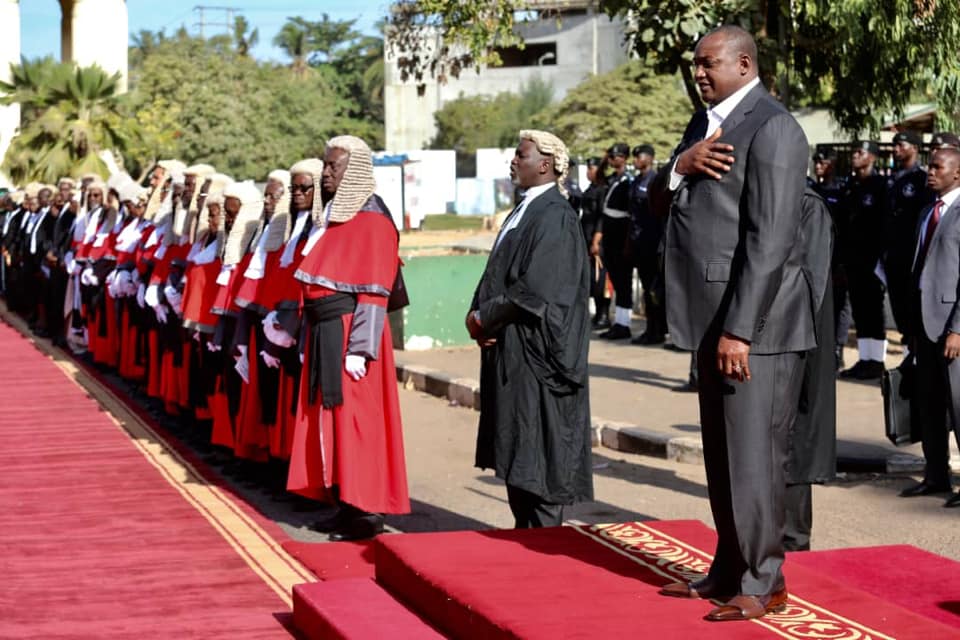
Pedro Dávalos y Lissón, the Peruvian scholar, once remarked with a subtle air of cynicism that “He who triumphs in discussion is not the one who has the best ideas or the most manifest common sense, but the one who talks the most and appears most cultured.”
This aphorism, draped in the opulent robes of historical insight, seems tailor-made for our modern-day Tantalus, Mai Ahmad Fatty, whose verbal acrobatics in defending the Judicial Officers Remuneration Bill would undoubtedly send the sophists spinning in their graves with a mixture of envy and mortification.
With the audacity of a misguided prophet and the hubris reminiscent of Oedipus at his zenith, Fatty has once again donned his academic robes to deliver a grand lecture, peppered with the kind of bravado that makes one question whether he believes Gambians have the memory of a goldfish.
His rhetorical flourishes, however, cannot obscure the fundamental weaknesses in his arguments nor the dissonance between his lofty pronouncements and the gritty realities of The Gambia’s socio-economic landscape.
Fatty’s career, characterised by controversy—with accusations of taking money from clients without providing adequate representation during his private practice, and his tenure as a state minister marred by scandal and allegations of pocketing kickbacks—paints a stark contrast to the virtues he claims to uphold.

If substantial salaries and benefits were indeed a panacea for corruption, Fatty, who enjoyed both, would have been beyond reproach. Yet, his career sings a different tune, one that resonates with the hollow promises of grandeur rather than the substantive realities of governance.
His impassioned defence of the bill is both flawed and misleading, revealing his superficial understanding of public financial management and the complexities and subtleties of the bill itself. His pontifications—that increasing remuneration for judges would inherently insulate them from corruption—contradict not only empirical evidence but also the philosophical teachings about ethical governance that caution against such oversimplified solutions.
As Socrates would argue, it is through understanding the underlying complexities and engaging in genuine dialectic that true wisdom emerges, not through grandiloquent assertions devoid of empirical support. The persistent gaps between Fatty’s professed ideals and his actions echo the warnings of classical philosophers against demagoguery and sophistry, serving as a reminder of the necessity for integrity and coherence in public service.
In “The Republic,” Plato suggests that the guardians of the state, like the judges Fatty wishes to enrich, should be insulated from material excess to better focus on their roles as impartial arbiters. Fatty’s proposal, then, in its extravagant disconnect from the economic landscape of The Gambia, would appear not as a solution but an exacerbation of the divide between the governors and the governed.
One might think he had taken a leaf out of Marie Antoinette’s book, suggesting that if the judiciary cannot have justice, let them have wealth instead. This philosophical and fiscal folly—worthy of a Dickensian critique—turns the judiciary into an aristocracy aloof from the plights of those they judge.
The proposal is as disconnected from reality as Alice’s adventures in Wonderland, a whimsical journey through a fiscal looking glass that transforms necessity into luxury. The disjunction between Fatty’s narrative and the lived experiences of ordinary Gambians is not only a testament to his detachment from grassroots realities but also a harbinger of potential social unrest if such disparities are not addressed.
Fatty’s financial fantasies, echoing the economic theories of a Gilded Age tycoon, seem to miss the basic tenets of governance found in Machiavelli’s “The Prince”, where realpolitik and public perception guide the hands of the state, not the whims of a detached elite. It is reminiscent of a grand, but hollow, spectacle worthy of Shakespeare’s King Lear, where ambition and folly lead to inevitable downfall.
Fatty’s disconnect from the pressing needs of Gambians is not only imprudent but also smacks of an elitism that is both anachronistic and dangerously detached from the democratic ethos that should guide public policy. His propositions reveal a fundamental misunderstanding of the principles of sound governance, which demand that leaders prioritise the welfare of the people over the aggrandisement of a select few. The apparent disconnect between Fatty’s lofty rhetoric and the grim economic realities facing The Gambia underscores the need for a more grounded and empathetic approach to public policymaking.

Fatty contends that the bill has been unfairly politicised and misunderstood. He argues that opposition from a segment of society does not inherently render the bill improper. Here, philosopher John Stuart Mill’s concept of the “wisdom of the masses” is pertinent. Mill argued that collective opinion often carries weight, especially when grounded in legitimate concerns.
The civil society’s outcry against the bill is deeply rooted in the economic realities facing Gambians. Prioritising judicial salaries over pressing needs such as healthcare and education is not just a misallocation of limited resources but a profound oversight in fiscal prudence. Moreover, the failure to address the root causes of judicial inefficiency and corruption through comprehensive reforms undermines the credibility of the bill and its proponents.
The current economic condition of The Gambia, characterised by high unemployment rates and inadequate social services, underscores the need for judicious fiscal management. Government budgetary constraints should be directed towards sectors that have a direct impact on the well-being of the population.
The prioritisation of judicial remuneration in the context of widespread poverty and lack of access to essential services is not only imprudent but morally questionable. It is essential to recognise that public opposition to the bill is not merely a political maneuver but a reflection of genuine concerns about resource allocation.
The voices of the masses, particularly in a democratic society, should not be dismissed lightly, as they represent the lived experiences and aspirations of the majority. Additionally, the principle of democratic accountability necessitates that lawmakers heed the concerns of their constituents rather than pursuing policies that primarily benefit a select few. The principles of good governance, as articulated by political theorists like Jean-Jacques Rousseau, emphasise the importance of aligning governmental policies with the collective will and welfare of the people.
Fatty’s narrative might be better suited for a Shakespearean drama, where hubris meets nemesis, and the public, akin to a Greek chorus, predicts the tragic outcomes of such folly. This perspective aligns with the Aristotelian ideal that the well-being of the polis must be the ultimate goal of any political endeavour, rather than the aggrandisement of a privileged few. The idea that leaders must act for the collective good, rather than personal gain, is a cornerstone of any ethical governance system, and Fatty’s defense of the bill starkly contradicts this principle.
Fatty posits that attractive salaries for judges will promote judicial independence, shielding them from corruption and undue influence. However, this argument overlooks the importance of robust institutional frameworks and oversight mechanisms. Transparency International highlights that judicial corruption can be effectively mitigated through transparency and accountability rather than solely financial incentives (Transparency International, 2023). Independence and integrity in the judiciary are nurtured through a strong judicial culture and ethical standards, not merely through high remuneration.
In addition to financial incentives, comprehensive reforms are necessary to establish a judiciary that is both independent and accountable. These reforms should include stringent ethical guidelines, regular audits, and the establishment of an independent oversight body to monitor judicial conduct. Furthermore, international best practices indicate that judicial independence is more effectively achieved through a combination of adequate remuneration and robust institutional support.

For instance, countries with lower judicial salaries but strong institutional frameworks often report lower levels of judicial corruption. It is also essential to consider the broader socio-economic context in which the judiciary operates. The disparity between judicial salaries and the average income of the population can create a perception of elitism and erode public trust in the judiciary.
Therefore, a balanced approach that includes financial incentives, institutional reforms, and public engagement is crucial for fostering judicial independence. Moreover, public trust in the judiciary is foundational to the rule of law and should not be compromised by perceptions of financial impropriety or elitism. Aristotle’s concept of “distributive justice” suggests that justice in society is achieved through a fair and equitable distribution of resources, ensuring that all segments of society benefit. A judiciary perceived as elitist and disconnected from the broader populace can undermine the very foundations of democratic governance and the rule of law.
Fatty cites salary hikes in Nigeria, Ghana, and Malawi as justifications for the bill. However, these comparisons are misleading. Despite substantial salary increases, Nigeria’s judiciary still struggles with significant corruption issues (Olaniyan, 2020). In Ghana, salary hikes for judges were accompanied by extensive public discourse and legislative scrutiny, ensuring transparency and public trust (Ghanaian Chronicle, 2023).
Merely replicating these salary structures in The Gambia without addressing systemic issues within the judiciary is insufficient. It is imperative to address the underlying challenges to judicial integrity and efficiency comprehensively. The socio-political contexts of Nigeria, Ghana, and Malawi are distinct from that of The Gambia, and what works in one country may not necessarily be effective in another.
Additionally, the implementation of salary hikes in these countries was part of broader judicial reforms aimed at enhancing the overall efficiency and accountability of the judiciary. In contrast, the proposed bill in The Gambia appears to focus solely on financial remuneration without addressing the necessary structural reforms.
The experiences of other countries also highlight the importance of stakeholder engagement and public participation in the reform process. By involving various segments of society, these countries were able to build consensus and garner support for the reforms. Therefore, it is crucial for The Gambia to adopt a holistic approach that includes financial, structural, and participatory elements to achieve meaningful judicial reform. Without such comprehensive measures, the bill risks becoming a superficial solution that fails to address the deeper issues plaguing the judiciary.
This aligns with the concept of “participatory governance,” which emphasises the involvement of citizens in decision-making processes to ensure that policies are reflective of and responsive to their needs. The superficial adoption of policies from other contexts without a thorough analysis of their applicability to The Gambia can lead to ineffective governance and wasted resources.
Fatty argues that ensuring judges’ financial security will prevent them from being compromised. While it is crucial to maintain judicial impartiality, prioritizing judicial salaries in a country where the average citizen struggles with basic necessities is problematic. Economist Amartya Sen emphasizes the importance of prioritizing public welfare and equitable resource distribution for genuine development (Sen, 1999). Ensuring that public servants are well-compensated should not come at the expense of broader societal needs.
The government must balance judicial remuneration with investments in essential public services. In a country like The Gambia, where a significant portion of the population lives below the poverty line, it is imperative to focus on policies that uplift the general populace. The allocation of resources should be guided by the principles of equity and social justice.
While it is important to ensure that judges are adequately compensated to maintain judicial integrity, this should not overshadow the urgent need to address widespread poverty, unemployment, and lack of access to basic services. The concept of distributive justice, as articulated by scholars such as John Rawls, underscores the need for a fair distribution of resources that benefits the least advantaged members of society (Rawls, 1971).
Therefore, a balanced approach that addresses both judicial remuneration and public welfare is essential for sustainable development. Moreover, the government’s budgetary decisions should reflect a commitment to reducing inequality and enhancing the quality of life for all citizens, not just a privileged few.
The principle of “public interest” in governance demands that decisions made by public officials should benefit the majority and not cater to the interests of a small elite. Fatty’s defense of the bill, rooted in an elitist perspective, fails to consider the broader social contract that binds the government to its people.

Fatty acknowledges that the bill’s unpopularity is partly due to ineffective public engagement. He notes that successful implementations in other countries involved taking the public along through extensive engagement. Political scientist James Fishkin underscores the necessity of deliberative democracy, where public engagement and consensus-building are paramount (Fishkin, 2011).
The lack of transparency and public involvement in the bill’s drafting process is a significant oversight. Effective public sensitization and engagement are crucial for garnering support and ensuring the legitimacy of such legislative measures. In democratic societies, public participation is not only a means of legitimizing policy decisions but also a way to ensure that policies reflect the needs and aspirations of the people.
The experiences of other countries demonstrate that meaningful public engagement can lead to more informed and accepted policy outcomes. Public hearings, consultations, and forums provide platforms for citizens to voice their opinions, concerns, and suggestions.
By incorporating public feedback, policymakers can enhance the relevance and effectiveness of their proposals. In the case of the Judicial Officers Remuneration Bill, a lack of public engagement has contributed to its unpopularity and the perception that it serves the interests of a select few. To build public trust and support, it is essential to adopt a transparent and inclusive approach that involves all stakeholders in the decision-making process.
Furthermore, fostering a culture of openness and dialogue can help bridge the gap between the government and the citizens, ensuring that policies are both effective and equitable. This approach aligns with the principles of “responsive governance,” which advocates for government actions that are attuned to the needs and feedback of the populace. In the absence of such engagement, the bill risks being perceived as another example of top-down policymaking detached from the realities of the citizenry.
Mai Fatty’s defense of the Judicial Officers Remuneration Bill, while articulately presented, falls short upon closer examination. The bill’s proponents must address the broader implications for The Gambia’s socio-economic landscape rather than focusing solely on judicial remuneration.
By prioritising public welfare, ensuring robust institutional frameworks, and fostering genuine public engagement, The Gambia can build a more equitable and just society. Political theorist John Rawls’ principle of justice as fairness underscores the need for equitable resource distribution, a principle that this bill, in its current form, fails to uphold (Rawls, 1971).
Additionally, the pursuit of judicial independence and integrity should be balanced with the needs and aspirations of the broader society. A comprehensive approach that includes financial incentives, structural reforms, and public participation is essential for achieving meaningful and sustainable judicial reform. The current economic realities and social challenges facing The Gambia necessitate a prudent and balanced allocation of resources.
Therefore, it is imperative to approach the debate on the Judicial Officers Remuneration Bill with a clear understanding of the broader context and the potential long-term consequences. By doing so, The Gambia can ensure that its policies promote justice, equity, and sustainable development for all its citizens.
Ultimately, the goal should be to create a judiciary that is not only independent and well-compensated but also reflective of and responsive to the needs of the society it serves. This perspective resonates with the idea of “ethical governance,” which advocates for decisions that uphold justice, equity, and the collective good. The alignment of policy decisions with the broader principles of social justice and equity is crucial for fostering a more inclusive and just society.
Who is Mai Fatty aka Ding Ding Mansa?
Like many of his contemporaries in The Gambia vying for the spotlight, Mai is, in the most literal sense, a lightweight scholar who is afflicted by Short Man syndrome. In my extensive exploration of psychological literature, I have encountered a phenomenon known as the ‘short man syndrome.’ This psychological condition suggests that individuals, often those of shorter stature, grapple with deep-seated feelings of inadequacy, which can manifest in compensatory displays of overly aggressive behavior.
Mai, who measures a mere five feet, seemingly would be a perfect patient that a psychologist would study to understand the compensatory mechanisms of self-esteem. Simply put, the qualities that typically define adept lawyers—critical thinking, rationality, and a reserved demeanor—are conspicuously absent in Mai’s public persona.
Instead, Mai compensates for these deficiencies with bluster, bravado, and ostentatious intellectual posturing, much like Nietzsche’s concept of the “will to power,” where individuals seek dominance and control to mask their insecurities. This penchant for grandiosity rather than reasoned argumentation raises significant questions about his ability to engage in nuanced policy formulation, especially in the complex realm of Public Financial Management.
Though Mr. Fatty previously held the post of interior minister and presidential adviser, he lacks the professional insight in political economy to fully grasp the nuances and subtleties of the bill. With all his bravado and grandstanding, Mr. Fatty holds a mere O-level certificate from Muslim High School. There are conjectures and rumors abound regarding his attainment of a law degree, potentially from an online university situated, if reports are to be believed, in the distant land of Tanzania.
Though Mai did eventually secure an admission to the Gambian bar, a pall of uncertainty shrouds the authenticity of his academic qualifications. While the issue of whether he indeed possesses a valid law degree or not might not be our paramount concern, it unquestionably takes on a new dimension of relevance when he asserts himself in the public sphere as an authoritative voice on topics for which his expertise remains dubious, at best.
Furthermore, the disparity between his public persona and his documented qualifications undermines his credibility as a policy advocate.
Moreover, many like Mai feign expertise in every domain, often using their rhetorical flourish to sway public opinion. Their eloquence, while captivating, masks a dearth of substantive knowledge and resembles the empty bombast of Polonius in Hamlet, ever prone to proffer advice yet tragically out of depth.
In this theatrical arena of public discourse, Mai, much like a poorly cast lead in a play of high stakes, uses grandiloquent language and dramatic flair, not to enlighten, but to obfuscate and dazzle, drawing on the shadows of Plato’s cave, where illusion reigns supreme. His speeches, filled with pomp and grandeur, often lack the analytical depth and empirical foundation necessary for sound policy discussions. This theatricality, while engaging, ultimately detracts from the substantive policy debate and highlights the need for more informed and measured voices in the public arena.
By Arfang Madi Sillah,
Washington DC

Disclaimer
The views expressed in this article are entirely those of the author and do not necessarily reflect the official policy or position of any affiliated institutions or organizations. The author takes full responsibility for the opinions and analysis presented herein. The author holds several academic degrees, including an undergraduate degree in English literature and literary theory.










Recent Comments